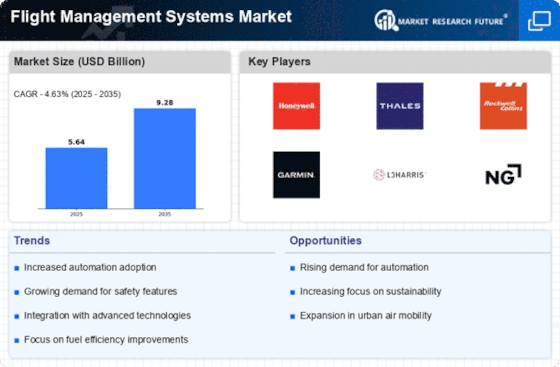Commercial Aviation
Military Aviation
General Aviation
Cargo Aviation
Autonomous Flight Management Systems
Assisted Flight Management Systems
Hybrid Flight Management Systems
Software
Hardware
Integrated Systems
Airlines
Cargo Operators
Private Operators
Military Air Forces
North America
Europe
South America
Asia Pacific
Middle East and Africa
North America Outlook (USD Billion, 2019-2032)
North America Flight Management Systems Market by Application Type
Commercial Aviation
Military Aviation
General Aviation
Cargo Aviation
North America Flight Management Systems Market by System Type
Autonomous Flight Management Systems
Assisted Flight Management Systems
Hybrid Flight Management Systems
North America Flight Management Systems Market by Component Type
Software
Hardware
Integrated Systems
North America Flight Management Systems Market by End Use Type
Airlines
Cargo Operators
Private Operators
Military Air Forces
North America Flight Management Systems Market by Regional Type
US
Canada
US Outlook (USD Billion, 2019-2032)
US Flight Management Systems Market by Application Type
Commercial Aviation
Military Aviation
General Aviation
Cargo Aviation
US Flight Management Systems Market by System Type
Autonomous Flight Management Systems
Assisted Flight Management Systems
Hybrid Flight Management Systems
US Flight Management Systems Market by Component Type
Software
Hardware
Integrated Systems
US Flight Management Systems Market by End Use Type
Airlines
Cargo Operators
Private Operators
Military Air Forces
CANADA Outlook (USD Billion, 2019-2032)
CANADA Flight Management Systems Market by Application Type
Commercial Aviation
Military Aviation
General Aviation
Cargo Aviation
CANADA Flight Management Systems Market by System Type
Autonomous Flight Management Systems
Assisted Flight Management Systems
Hybrid Flight Management Systems
CANADA Flight Management Systems Market by Component Type
Software
Hardware
Integrated Systems
CANADA Flight Management Systems Market by End Use Type
Airlines
Cargo Operators
Private Operators
Military Air Forces
Europe Outlook (USD Billion, 2019-2032)
Europe Flight Management Systems Market by Application Type
Commercial Aviation
Military Aviation
General Aviation
Cargo Aviation
Europe Flight Management Systems Market by System Type
Autonomous Flight Management Systems
Assisted Flight Management Systems
Hybrid Flight Management Systems
Europe Flight Management Systems Market by Component Type
Software
Hardware
Integrated Systems
Europe Flight Management Systems Market by End Use Type
Airlines
Cargo Operators
Private Operators
Military Air Forces
Europe Flight Management Systems Market by Regional Type
Germany
UK
France
Russia
Italy
Spain
Rest of Europe
GERMANY Outlook (USD Billion, 2019-2032)
GERMANY Flight Management Systems Market by Application Type
Commercial Aviation
Military Aviation
General Aviation
Cargo Aviation
GERMANY Flight Management Systems Market by System Type
Autonomous Flight Management Systems
Assisted Flight Management Systems
Hybrid Flight Management Systems
GERMANY Flight Management Systems Market by Component Type
Software
Hardware
Integrated Systems
GERMANY Flight Management Systems Market by End Use Type
Airlines
Cargo Operators
Private Operators
Military Air Forces
UK Outlook (USD Billion, 2019-2032)
UK Flight Management Systems Market by Application Type
Commercial Aviation
Military Aviation
General Aviation
Cargo Aviation
UK Flight Management Systems Market by System Type
Autonomous Flight Management Systems
Assisted Flight Management Systems
Hybrid Flight Management Systems
UK Flight Management Systems Market by Component Type
Software
Hardware
Integrated Systems
UK Flight Management Systems Market by End Use Type
Airlines
Cargo Operators
Private Operators
Military Air Forces
FRANCE Outlook (USD Billion, 2019-2032)
FRANCE Flight Management Systems Market by Application Type
Commercial Aviation
Military Aviation
General Aviation
Cargo Aviation
FRANCE Flight Management Systems Market by System Type
Autonomous Flight Management Systems
Assisted Flight Management Systems
Hybrid Flight Management Systems
FRANCE Flight Management Systems Market by Component Type
Software
Hardware
Integrated Systems
FRANCE Flight Management Systems Market by End Use Type
Airlines
Cargo Operators
Private Operators
Military Air Forces
RUSSIA Outlook (USD Billion, 2019-2032)
RUSSIA Flight Management Systems Market by Application Type
Commercial Aviation
Military Aviation
General Aviation
Cargo Aviation
RUSSIA Flight Management Systems Market by System Type
Autonomous Flight Management Systems
Assisted Flight Management Systems
Hybrid Flight Management Systems
RUSSIA Flight Management Systems Market by Component Type
Software
Hardware
Integrated Systems
RUSSIA Flight Management Systems Market by End Use Type
Airlines
Cargo Operators
Private Operators
Military Air Forces
ITALY Outlook (USD Billion, 2019-2032)
ITALY Flight Management Systems Market by Application Type
Commercial Aviation
Military Aviation
General Aviation
Cargo Aviation
ITALY Flight Management Systems Market by System Type
Autonomous Flight Management Systems
Assisted Flight Management Systems
Hybrid Flight Management Systems
ITALY Flight Management Systems Market by Component Type
Software
Hardware
Integrated Systems
ITALY Flight Management Systems Market by End Use Type
Airlines
Cargo Operators
Private Operators
Military Air Forces
SPAIN Outlook (USD Billion, 2019-2032)
SPAIN Flight Management Systems Market by Application Type
Commercial Aviation
Military Aviation
General Aviation
Cargo Aviation
SPAIN Flight Management Systems Market by System Type
Autonomous Flight Management Systems
Assisted Flight Management Systems
Hybrid Flight Management Systems
SPAIN Flight Management Systems Market by Component Type
Software
Hardware
Integrated Systems
SPAIN Flight Management Systems Market by End Use Type
Airlines
Cargo Operators
Private Operators
Military Air Forces
REST OF EUROPE Outlook (USD Billion, 2019-2032)
REST OF EUROPE Flight Management Systems Market by Application Type
Commercial Aviation
Military Aviation
General Aviation
Cargo Aviation
REST OF EUROPE Flight Management Systems Market by System Type
Autonomous Flight Management Systems
Assisted Flight Management Systems
Hybrid Flight Management Systems
REST OF EUROPE Flight Management Systems Market by Component Type
Software
Hardware
Integrated Systems
REST OF EUROPE Flight Management Systems Market by End Use Type
Airlines
Cargo Operators
Private Operators
Military Air Forces
APAC Outlook (USD Billion, 2019-2032)
APAC Flight Management Systems Market by Application Type
Commercial Aviation
Military Aviation
General Aviation
Cargo Aviation
APAC Flight Management Systems Market by System Type
Autonomous Flight Management Systems
Assisted Flight Management Systems
Hybrid Flight Management Systems
APAC Flight Management Systems Market by Component Type
Software
Hardware
Integrated Systems
APAC Flight Management Systems Market by End Use Type
Airlines
Cargo Operators
Private Operators
Military Air Forces
APAC Flight Management Systems Market by Regional Type
China
India
Japan
South Korea
Malaysia
Thailand
Indonesia
Rest of APAC
CHINA Outlook (USD Billion, 2019-2032)
CHINA Flight Management Systems Market by Application Type
Commercial Aviation
Military Aviation
General Aviation
Cargo Aviation
CHINA Flight Management Systems Market by System Type
Autonomous Flight Management Systems
Assisted Flight Management Systems
Hybrid Flight Management Systems
CHINA Flight Management Systems Market by Component Type
Software
Hardware
Integrated Systems
CHINA Flight Management Systems Market by End Use Type
Airlines
Cargo Operators
Private Operators
Military Air Forces
INDIA Outlook (USD Billion, 2019-2032)
INDIA Flight Management Systems Market by Application Type
Commercial Aviation
Military Aviation
General Aviation
Cargo Aviation
INDIA Flight Management Systems Market by System Type
Autonomous Flight Management Systems
Assisted Flight Management Systems
Hybrid Flight Management Systems
INDIA Flight Management Systems Market by Component Type
Software
Hardware
Integrated Systems
INDIA Flight Management Systems Market by End Use Type
Airlines
Cargo Operators
Private Operators
Military Air Forces
JAPAN Outlook (USD Billion, 2019-2032)
JAPAN Flight Management Systems Market by Application Type
Commercial Aviation
Military Aviation
General Aviation
Cargo Aviation
JAPAN Flight Management Systems Market by System Type
Autonomous Flight Management Systems
Assisted Flight Management Systems
Hybrid Flight Management Systems
JAPAN Flight Management Systems Market by Component Type
Software
Hardware
Integrated Systems
JAPAN Flight Management Systems Market by End Use Type
Airlines
Cargo Operators
Private Operators
Military Air Forces
SOUTH KOREA Outlook (USD Billion, 2019-2032)
SOUTH KOREA Flight Management Systems Market by Application Type
Commercial Aviation
Military Aviation
General Aviation
Cargo Aviation
SOUTH KOREA Flight Management Systems Market by System Type
Autonomous Flight Management Systems
Assisted Flight Management Systems
Hybrid Flight Management Systems
SOUTH KOREA Flight Management Systems Market by Component Type
Software
Hardware
Integrated Systems
SOUTH KOREA Flight Management Systems Market by End Use Type
Airlines
Cargo Operators
Private Operators
Military Air Forces
MALAYSIA Outlook (USD Billion, 2019-2032)
MALAYSIA Flight Management Systems Market by Application Type
Commercial Aviation
Military Aviation
General Aviation
Cargo Aviation
MALAYSIA Flight Management Systems Market by System Type
Autonomous Flight Management Systems
Assisted Flight Management Systems
Hybrid Flight Management Systems
MALAYSIA Flight Management Systems Market by Component Type
Software
Hardware
Integrated Systems
MALAYSIA Flight Management Systems Market by End Use Type
Airlines
Cargo Operators
Private Operators
Military Air Forces
THAILAND Outlook (USD Billion, 2019-2032)
THAILAND Flight Management Systems Market by Application Type
Commercial Aviation
Military Aviation
General Aviation
Cargo Aviation
THAILAND Flight Management Systems Market by System Type
Autonomous Flight Management Systems
Assisted Flight Management Systems
Hybrid Flight Management Systems
THAILAND Flight Management Systems Market by Component Type
Software
Hardware
Integrated Systems
THAILAND Flight Management Systems Market by End Use Type
Airlines
Cargo Operators
Private Operators
Military Air Forces
INDONESIA Outlook (USD Billion, 2019-2032)
INDONESIA Flight Management Systems Market by Application Type
Commercial Aviation
Military Aviation
General Aviation
Cargo Aviation
INDONESIA Flight Management Systems Market by System Type
Autonomous Flight Management Systems
Assisted Flight Management Systems
Hybrid Flight Management Systems
INDONESIA Flight Management Systems Market by Component Type
Software
Hardware
Integrated Systems
INDONESIA Flight Management Systems Market by End Use Type
Airlines
Cargo Operators
Private Operators
Military Air Forces
REST OF APAC Outlook (USD Billion, 2019-2032)
REST OF APAC Flight Management Systems Market by Application Type
Commercial Aviation
Military Aviation
General Aviation
Cargo Aviation
REST OF APAC Flight Management Systems Market by System Type
Autonomous Flight Management Systems
Assisted Flight Management Systems
Hybrid Flight Management Systems
REST OF APAC Flight Management Systems Market by Component Type
Software
Hardware
Integrated Systems
REST OF APAC Flight Management Systems Market by End Use Type
Airlines
Cargo Operators
Private Operators
Military Air Forces
South America Outlook (USD Billion, 2019-2032)
South America Flight Management Systems Market by Application Type
Commercial Aviation
Military Aviation
General Aviation
Cargo Aviation
South America Flight Management Systems Market by System Type
Autonomous Flight Management Systems
Assisted Flight Management Systems
Hybrid Flight Management Systems
South America Flight Management Systems Market by Component Type
Software
Hardware
Integrated Systems
South America Flight Management Systems Market by End Use Type
Airlines
Cargo Operators
Private Operators
Military Air Forces
South America Flight Management Systems Market by Regional Type
Brazil
Mexico
Argentina
Rest of South America
BRAZIL Outlook (USD Billion, 2019-2032)
BRAZIL Flight Management Systems Market by Application Type
Commercial Aviation
Military Aviation
General Aviation
Cargo Aviation
BRAZIL Flight Management Systems Market by System Type
Autonomous Flight Management Systems
Assisted Flight Management Systems
Hybrid Flight Management Systems
BRAZIL Flight Management Systems Market by Component Type
Software
Hardware
Integrated Systems
BRAZIL Flight Management Systems Market by End Use Type
Airlines
Cargo Operators
Private Operators
Military Air Forces
MEXICO Outlook (USD Billion, 2019-2032)
MEXICO Flight Management Systems Market by Application Type
Commercial Aviation
Military Aviation
General Aviation
Cargo Aviation
MEXICO Flight Management Systems Market by System Type
Autonomous Flight Management Systems
Assisted Flight Management Systems
Hybrid Flight Management Systems
MEXICO Flight Management Systems Market by Component Type
Software
Hardware
Integrated Systems
MEXICO Flight Management Systems Market by End Use Type
Airlines
Cargo Operators
Private Operators
Military Air Forces
ARGENTINA Outlook (USD Billion, 2019-2032)
ARGENTINA Flight Management Systems Market by Application Type
Commercial Aviation
Military Aviation
General Aviation
Cargo Aviation
ARGENTINA Flight Management Systems Market by System Type
Autonomous Flight Management Systems
Assisted Flight Management Systems
Hybrid Flight Management Systems
ARGENTINA Flight Management Systems Market by Component Type
Software
Hardware
Integrated Systems
ARGENTINA Flight Management Systems Market by End Use Type
Airlines
Cargo Operators
Private Operators
Military Air Forces
REST OF SOUTH AMERICA Outlook (USD Billion, 2019-2032)
REST OF SOUTH AMERICA Flight Management Systems Market by Application Type
Commercial Aviation
Military Aviation
General Aviation
Cargo Aviation
REST OF SOUTH AMERICA Flight Management Systems Market by System Type
Autonomous Flight Management Systems
Assisted Flight Management Systems
Hybrid Flight Management Systems
REST OF SOUTH AMERICA Flight Management Systems Market by Component Type
Software
Hardware
Integrated Systems
REST OF SOUTH AMERICA Flight Management Systems Market by End Use Type
Airlines
Cargo Operators
Private Operators
Military Air Forces
MEA Outlook (USD Billion, 2019-2032)
MEA Flight Management Systems Market by Application Type
Commercial Aviation
Military Aviation
General Aviation
Cargo Aviation
MEA Flight Management Systems Market by System Type
Autonomous Flight Management Systems
Assisted Flight Management Systems
Hybrid Flight Management Systems
MEA Flight Management Systems Market by Component Type
Software
Hardware
Integrated Systems
MEA Flight Management Systems Market by End Use Type
Airlines
Cargo Operators
Private Operators
Military Air Forces
MEA Flight Management Systems Market by Regional Type
GCC Countries
South Africa
Rest of MEA
GCC COUNTRIES Outlook (USD Billion, 2019-2032)
GCC COUNTRIES Flight Management Systems Market by Application Type
Commercial Aviation
Military Aviation
General Aviation
Cargo Aviation
GCC COUNTRIES Flight Management Systems Market by System Type
Autonomous Flight Management Systems
Assisted Flight Management Systems
Hybrid Flight Management Systems
GCC COUNTRIES Flight Management Systems Market by Component Type
Software
Hardware
Integrated Systems
GCC COUNTRIES Flight Management Systems Market by End Use Type
Airlines
Cargo Operators
Private Operators
Military Air Forces
SOUTH AFRICA Outlook (USD Billion, 2019-2032)
SOUTH AFRICA Flight Management Systems Market by Application Type
Commercial Aviation
Military Aviation
General Aviation
Cargo Aviation
SOUTH AFRICA Flight Management Systems Market by System Type
Autonomous Flight Management Systems
Assisted Flight Management Systems
Hybrid Flight Management Systems
SOUTH AFRICA Flight Management Systems Market by Component Type
Software
Hardware
Integrated Systems
SOUTH AFRICA Flight Management Systems Market by End Use Type
Airlines
Cargo Operators
Private Operators
Military Air Forces
REST OF MEA Outlook (USD Billion, 2019-2032)
REST OF MEA Flight Management Systems Market by Application Type
Commercial Aviation
Military Aviation
General Aviation
Cargo Aviation
REST OF MEA Flight Management Systems Market by System Type
Autonomous Flight Management Systems
Assisted Flight Management Systems
Hybrid Flight Management Systems
REST OF MEA Flight Management Systems Market by Component Type
Software
Hardware
Integrated Systems
REST OF MEA Flight Management Systems Market by End Use Type
Airlines
Cargo Operators
Private Operators
Military Air Forces


















Leave a Comment